HIT CHANNEL EXCLUSIVE INTERVIEW: August 2014. We had the great honour to talk with a legendary violinist and composer: Jean-Luc Ponty. He has a very successful solo career and has played with Frank Zappa, Mahavishnu Orchestra, Elton John, Stanley Clarke, Al Di Meola, Return to Forever, Allan Holdsworth and many others. He is currently working with Jon Anderson of YES on the first album of Anderson Ponty Band. Read below the very interesting things he told us:
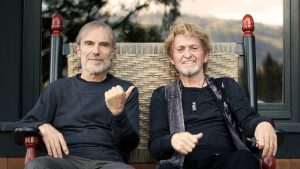 How did you get in touch with Jon Anderson?
How did you get in touch with Jon Anderson?
We knew each other from the past. When I was with the band Mahavishnu Orchestra with John McLaughlin . When we toured in 1974 or ’75 in the U.S we did one show with Yes. The two bands together. And then, maybe 10 years later I was in the offices of Atlantic Records in Los Angeles, coming out of a meeting because that was the record label I was with at the time and Yes was also on Atlantic Records. He was walking in to a meeting, so we cross passed. We were introduced and we talked briefly. I told him that I really admired his singing and creative songwriting and he said that he liked my violin playing and my music too and even suggested at the time that we do a project together at some point. But then, we never met again and you know life goes on and we were put in contact again a year ago. A producer of his was talking about me doing a violin solo on his song. And when we got in contact, we came up with the idea putting a band together. So, it’s funny that it happens so late. But better late than never.
You are writing music for the debut album of Anderson Ponty Band. Can you give us some info about its sound?
It’s always difficult to describe sounds with words. I would say that there is his musical personality, which means the way he sings, the kind of melodies he always wrote with arrangements that are a lot more up-to-date in terms of rhythms and sounds. But we are going to play a very limited number of classics of each other. Because I know the fans are always happy to hear some pieces that they liked in the past and we like to play still today. But some pieces we did –him and me- are still sounding very good today. So, we keep that. The idea is to keep our musical personalities and the original sounds, but the production will be more modern.
Why you decided to start a Kickstarter campaign for the recording of the album?
That was really a management’s choice. We have a manager in common, he is who put us together, and he had interest from record companies. No problem. But, I guess he wanted to keep control and use today’s ways of producing an album as opposed to the old way when an artist had no other choice than signing with a record company. He decided to go this way and then Jon and myself said: “It’s ok. Let’s do it. Let’s see how it works”.
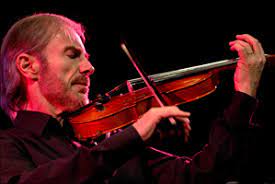 Did you enjoy playing with Allan Holdsworth on your album “The Acatama Experience” in 2007?
Did you enjoy playing with Allan Holdsworth on your album “The Acatama Experience” in 2007?
I’m such a big fan of Allan Holdsworth. I think he’s a genius with the guitar. What really moves me the most is that his playing is so emotional. It’s not just astonishing on a technical point of view of the notes he plays, but it is the emotion that it carries through its playing. I met him a long-long time ago. I invited him a few times. In 1977 on my album “Enigmatic Ocean”. That was the first time. But there was another album after that, I think it’s on “Individual Choice” in 1983. And from all the solos he has done on my albums, this last one (ed: in the song “Point of No Return” from “The Acatama Experience” album) is the most beautiful for me.
How important is improvisation for you?
Well, it’s not the only important thing in the world for me, musically. When I started as a young musician, my goal was to become a composer. I first studied classical music and I wanted to become a classical conductor and composer. And then I discovered jazz and jazz gave me the opportunity to keep playing an instrument and being a composer at the same time. That’s what I like with the improvisation: that it’s very spontaneous, very stimulating and there is a feeling of freedom and also it allows you to go into adventure every time you play. It’s not like repeating the same thing over and over. I love both. I think for me it’s also very important to work on the structures and achieve a band sound and make sure that all the musicians understand what kind of emotion, should be conveyed. So that you don’t play funky all the time or sentimental all the time. Each piece should tell a different story. So, the structure is very important of course. But then, once you get used to improvisation, it’s difficult to do without it. So for me, it’s a balance between the two. The two are equally important in my music. For instance, I pay a lot of attention to my composition and the arrangement and the way the band is going to sound playing them. And then the other half is improvisation. So, it’s kind of 50-50.
Can you describe us your first meeting with Frank Zappa at his home?
I knew of his reputation. I was arriving from France at the time but even then, it was ’68 and in ’69 he was already famous in the circles of avant-garde music like jazz and rock. I knew his music, but it was the first meeting and I didn’t know how he would react. I was surprised that he was very humble. Not like a rock star at all. That surprised me. He had series of meeting one after the other. And ours was like at midnight or 1am and his children were running in the house. And Dweezil was running in the house at midnight or 1am. So, we were waiting at the time. It was my producer’s (ed: Richard Bock) idea, that I meet him and maybe do a project with him. So my record producer said: “I’m going to play you a recording by Jean-Luc and George Duke”. So, he listened to it and said: “What do you want me to do? These guys are too good for me to play with”. So that’s why I thought that he was very humble to say that. I was very surprised. My record producer said: “We would like you to produce his next album and arrange your music for Jean-Luc’s next project” and he accepted immediately. Of course, he must have had some music ready that was not yet recorded or he rearranged some. He was very fast. Two weeks later, we were in the studio. It was a good surprise.
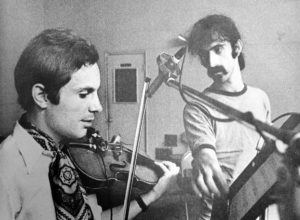 Are you proud of your participation in Frank Zappa’s “Hot Rats” (1969) album?
Are you proud of your participation in Frank Zappa’s “Hot Rats” (1969) album?
Yes, but I don’t really play much in there. I just played one song (“It Must Be a Camel”). In fact, what happened is that he was recording “Hot Rats” at the same time when we met. So, he invited me to go to his studio so that we know each other a little better before he works on my album. So, I came with my violin and he said: “Would you like to play in this song?” So, yes I played just that melody. It’s Don “Sugarcane” Harris who is soloing the most. And he has done a great solo. He was a great blues player. I’m happy to be on it because it was a great album. I’m happy to be part of it. Of course I didn’t participate as much as on my “King Kong” and later on (ed: on “Over-Nite Sensation”, “Piquantique” and “Apostrophe” albums) when I toured with him. I was a lot more involved.
Why you said that Frank Zappa was a prisoner of his own image?
I said that because everybody thinks of him as a rock ‘n’ roll freak. He really loved writing serious music. I think he would have loved to become a classical composer. And he could do that. He was very creative and had the talent to do it. Except he was born in the desert in California and therefore was almost self-taught. He really didn’t study. If he had been born in Europe, I’m sure he would have gone to a music school, to go to a conservatory of some sort to study composition. You know, all the time when people ask me about Frank Zappa they are very surprised to hear that in fact he never took any drugs, he was very straight, he had a lot of humour, he was quite funny for sure. He wasn’t that serious when you had to work with him. He wasn’t someone who was not very funny, who is too serious. No, he had a lot of humour of course. But, he wasn’t at all the freak, the crazy guy that most people thought he was.
Mark Farner of Grand Funk Railroad told me that Frank Zappa was drinking coffee all the time.
Yes, that’s true. He loved the strong coffee, which was rare in the U.S at the time. And he was carrying a big thermos of coffee with him all day long. He was working every night. Maybe thanks to coffee.
Was it an interesting experience for you to work with George Martin (The Beatles producer) on Mahavishnu Orchestra’s “Apocalypse” (1974) album?
Yes, I think he is a very intelligent arranger and producer. From the way he puts the recording and gives his advice on the music. It really makes sense. I mean, he was a very pleasant guy. Very-very pleasant. Very nice. So, it was a very good experience. We got along very well. He invited me to his house. He loved French wines. At first, when we were arriving from America, and because of my accent, he thought that I was Canadian, French-Canadian. So, he asked me: “Are you French-Canadian?” and I said: “No, I’m French-French”. And he answered: “Oh! I don’t mind”. I said: “What??” and he said: “British humour”. And instantly we became friends and he said: “Oh, you are French, so you must like good wine” and invited me to his house. In fact, he called me back, years later. I think he was producing an album for Paul McCartney and wanted me to play on it, but I wasn’t in Los Angeles at the right time, so it didn’t happen.
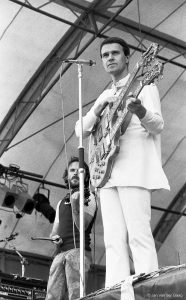 Are you proud of being one of the very first violinists in jazz and rock music?
Are you proud of being one of the very first violinists in jazz and rock music?
It’s kind of a chance I had to be there at a time that not any other violinists had done much for the violin in jazz and rock. I had a vision very early as soon as I started playing with jazz and rock bands. I had a sound in my mind immediately of what I could do with the violin in these new styles of music. And I knew nobody else had done it before or very few. So, I liked the idea to do it and if you are one of the first to do it, then you never know if it ‘s really worth anything until it can be evaluated so many years later and now I can tell that it was good I did it then. And it’s rewarding to be contacted by young musicians, very young ones from any style of music including classical from all over the world who really appreciate what I have done and all ask my advice. So, yes it’s good.
Do you think playing with different people is a kind of evolution too?
Yes, absolutely. Of course I got a lot more offers than I accepted. All the time, I have been solicitated to do collaborations. Initially, when I moved to America and after I played with Zappa and Mahavishnu, my goal was to compose my own music and do my own creations. At that time, I refused all collaborations and I wanted to focus on my own music and be recognized for this. But now, after so many years, yes on the contrary it’s very stimulating and that keeps me from becoming senile (laughs) when still at my age –for instance for the past two years- I have been playing my music with symphony orchestras. And I’m really enjoying to be invited in Russia, Brazil, so many places. And some places I have never played before, all the way to Siberia. Now, we are going to record a new album as an acoustic trio with Stanley Clarke on bass and Bireli Lagrene on guitar. Bireli Lagrene is a Gypsy French. To me –and not just to me- he’s the greatest Gypsy guitarist since Django Reinhardt. I have my musical personality and I’m not going to change because I am playing with someone else. But to be collaborating with other great musicians, each one has sometimes a different approach, a different view and that is very stimulating for each other. When the energy is very positive and people are happy to be together and then we can come up with greater things than alone.
Are you still interested in African music?
Yes. But it wouldn’t make sense for me to keep playing African music. When I discovered the music from West Africa it was so new to my ears that I was very excited to do a project with these musicians. And still to this day, it left some kind of influence in my way of handling rhythm. I’m still open to all kinds of music. But my focus it’s not so much on African music of course. It’s coming back to my own culture and that is very important. I feel like someone who has been travelling around the world and you feel enriched by discovering other people’s culture but without forgetting your own. So, what is important to me is to express myself and the best way I can do it in a profound way is to draw from my own cultural background. Of course my cultural background is the addition of the European culture, which I grew up with and the American culture which is the second part of my life since I moved there when I was 30 years old.
Are Classical music and jazz music two different worlds for you?
Yes, they are. I mean they can meet somewhere. The thing is classical music is a great source of inspiration including for jazz musicians still today. You know, jazz musicians I know very well like John McLaughlin and Chick Corea are very fond of some classical composers and we talked about some works. I think it’s important for jazz musicians to have the knowledge of what the classical composers have created on the melodic and harmonic point of view. But jazz is a totally different game because in classical music the goal is to reproduce every note exactly… It’s like being an actor. You have to get a feel for what emotions and ideas the composers want to put on it. Like an actor has to understand from the text the role, the emotions of the person he is impersonating. In classical music, you learn somehow to reach perfection. Each time you play a Concerto for Violin for instance, it’s the same notes you play all the time. So, what you try to achieve is perfection, but by doing it all the time you can get better and better all time as well. In jazz it’s different. When you improvise, you take risks. You might play notes you have never played before. And this is the way you play when you improvise, so the technical perfection is not that important to those who take risks. Jazz music is more music theory than instrument and technique.
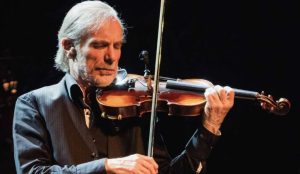 Mahavishnu Orchestra played at the first Knebworth Festival in 1974 along with The Allman Brothers Band, Van Morrison, The Doobie Brothers, The Sensational Alex Harvey Band and Tim Buckley. Do you remember that show? Did you meet any of the other musicians?
Mahavishnu Orchestra played at the first Knebworth Festival in 1974 along with The Allman Brothers Band, Van Morrison, The Doobie Brothers, The Sensational Alex Harvey Band and Tim Buckley. Do you remember that show? Did you meet any of the other musicians?
The problem is we didn’t meet other musicians. Because it was so big. There were so many people, so there wasn’t that much interaction between the bands which were arriving, playing and leaving.
In 2011 you toured with Return to Forever. Did you have a good time playing with Chick Corea and Return to Forever?
Oh yes, a great time. It’s a bit the same story as with Jon Anderson. As soon as I arrived in America, I became friends with Chick Corea and Stanley Clarke. After I left the Mahavishnu Orchestra, they asked me if I would join Return to Forever. But I had just started my own band and although it was a difficult decision I decided to keep going with my band. So, I’m a very lucky guy. It’s amazing how much luck I had, because I lived long enough to finally be invited again by Chick Corea and Stanley Clarke in 2011. Finally, we did it (laughs). We have so much in common musically, that’s why it was fun. You asked me about collaborations: Chick Corea is such an amazing musician. Because he can play very difficult music that is written music, and then he can also improvise on anything so easily and each night different. I was very impressed. So, it pushes you to play your best every night. It was very stimulating, very good.
Can you tell us some interesting offers you turned down because you were busy or for any other reason?
No, I only mention those I accept because I don’t need enemies (laughs). Sometimes it’s because I was busy, other times because I didn’t think it was good.
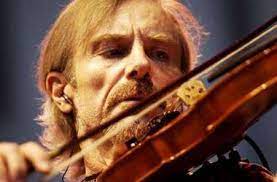 Is there anyone you would like to play with and hasn’t happened yet?
Is there anyone you would like to play with and hasn’t happened yet?
Not anyone I can think of, right now. I just regret not to have played with Jaco Pastorius. We met each other and he said: “We should do something together”. But at the time you don’t expect someone to die so young. So, it’s too bad. I regret that. There are some young musicians who sometimes I hear playing in great bands. I would be interested sometimes to play also with some not-so-well-known musicians from young bands. I don’t have so much time. I can’t do so many things. Already, right now I have two projects at the same time on my head.
A huge “THANK YOU” to Mr Jean-Luc Ponty for his time and to Billy James for his valuable help.
Anderson Ponty Band Kickstarter campaign: https://www.kickstarter.com/projects/1711196158/jon-anderson-and-jean-luc-ponty-project
Anderson Ponty Band Facebook: https://www.facebook.com/andersonpontyband
Official Jean-Luc Ponty website: www.ponty.com

